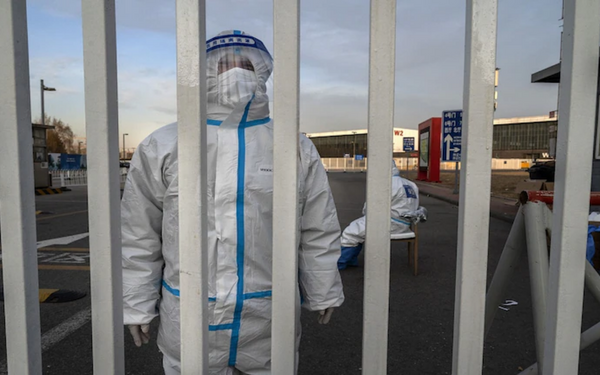Experts in Apple’s supply chain are warning that a broad coronavirus outbreak in China poses an increasing possibility of a month-long disruption in the manufacture of iPhones, putting a damper on the company’s bottom line.
A Covid-19 epidemic that began in October has caused more than a month of mayhem at the Foxconn megafactory in Zhengzhou, China, often known as “iPhone City,” where the company’s products are assembled.
Swiss bank UBS conducted research that found that consumers in the United States waiting an average of 23 days for high-end iPhones due to Foxconn shifting manufacturing to various plants around China.
The prospect for worker shortages at component plants or assembly facilities across China has increased as the Chinese government rolls back its zero-Covid policy.
Bindiya Vakil, CEO of Resilinc, a California company that tracks more than 3 million components to provide supply chain mapping services, said, “We should be seeing a lot of operations get impacted by absenteeism, not just at factories, but warehouse, distribution, logistic, and transportation facilities as well.”
On November 6th, Apple said that there will be “substantial” downtime leading up to the holidays. This unusual announcement came as management predicted slow sales growth of less than 8% in the important time around Christmas.
According to an aggregation of bank projections performed by Visible Alpha, the general opinion is that the company’s revenues this quarter will be slightly lower than the record $123.9 billion it attained during the same time last year, while net profits are expected to decline by more than 8 percent. A shortfall of 5 million to 15 million iPhones might put an end to Apple’s 14-quarter revenue growth run.
Forecasts for the next six months were boosted by several experts at first because they thought delayed orders wouldn’t be cancelled.
The removal of rigorous pandemic regulations by President Xi Jinping has raised the dangers to Apple’s sales for 2023, with modelling showing that 1 million Chinese citizens are at risk of dying from Covid over the approaching winter months. A Beijing Apple Store had to reduce its hours last week because several of its employees had become ill.
More than 90% of iPhones are built in China, which accounts for 20% of Apple’s total income. Samsung, a major smartphone competitor, left China in 2019 and now produces in at least four other nations.
Horace Dediu, an independent analyst at the consultancy Asymco, has predicted that Apple’s manufacturing and operational troubles of recent months might be followed by a demand crisis in China as customers reprioritize purchasing habits.
Dediu said that the increase in demand elsewhere in the globe during lockdowns was the result of people working from home or receiving government stimulus. Chinese consumers may choose to stay on the sidelines in 2019 due to weak defences and few safety nets.
Foxconn, Pegatron, and Wistron, three of Apple’s most key suppliers in Taiwan, are looking to grow their relatively new businesses in India.
According to CyberMedia Research’s head of industrial intelligence group in Gurgaon, India, Prabhu Ram, 7%-18% of iPhones are produced in India, with the three major Taiwanese suppliers aiming for 18% of iPhone assembly in India by 2024.
Alan Day, chair of State of Flux, a London supply chain consultancy working with the UN on corporate guidelines for reacting to Covid outbreaks, has claimed that China’s determination to wipe out the illness rather than manage it has left the country’s manufacturing lines vulnerable.
Due to China’s inexperience with Covid, “the next two to six months truly will be a decisive moment for Apple’s supply chain,” said Apple executive John Day. China has lagged behind the rest of the world in encouraging its businesses to adopt international standards.

Subtly charming pop culture geek. Amateur analyst. Freelance tv buff. Coffee lover
